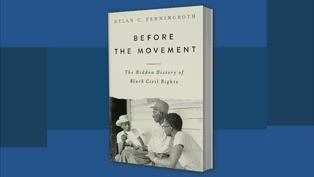Chicago Tonight: Black Voices
Improving Mental Health Care Access on the South, West Sides
Clip: 10/2/2024 | 9m 5sVideo has Closed Captions
Advocates say there's still much work to be done.
Chicago will no longer have members of the police and fire departments on its mental health emergency response teams.
Problems playing video? | Closed Captioning Feedback
Problems playing video? | Closed Captioning Feedback
Chicago Tonight: Black Voices is a local public television program presented by WTTW
Chicago Tonight: Black Voices
Improving Mental Health Care Access on the South, West Sides
Clip: 10/2/2024 | 9m 5sVideo has Closed Captions
Chicago will no longer have members of the police and fire departments on its mental health emergency response teams.
Problems playing video? | Closed Captioning Feedback
How to Watch Chicago Tonight: Black Voices
Chicago Tonight: Black Voices is available to stream on pbs.org and the free PBS App, available on iPhone, Apple TV, Android TV, Android smartphones, Amazon Fire TV, Amazon Fire Tablet, Roku, Samsung Smart TV, and Vizio.
Providing Support for PBS.org
Learn Moreabout PBS online sponsorship>> Chicago will no longer have members of the police and fire departments on its mental health emergency response teams.
The crisis assistance response and engagement program also known as care is moving to a new staffing model with all public health workers.
It's part of Mayor Brandon Johnson's plan to end criminalization of mental health issues and help people get the care they need.
But advocates say there is still much more work to be done to improve access.
Joining us via zoom are Cheryl Miller, public health organizer for Southside together, organizing power, also known as Stop Chicago and on Money Treatment, not trauma organizer with the Brighton Park Neighborhood Council.
They're both members of the collaborative for Community Wellness, Coalition.
And we also invited the Chicago Department of Public Health this evening, but they declined our request.
We thank Cheryl and Ani for joining us.
I'm Cheryl Miller.
Let's start with you.
Please describe the state of mental health supports and services in the communities that you work with.
On the South side.
>> There is a dire need.
For mental health care.
>> On this all sign them the West Side.
>> Way the collaborative for community wellness is W and providers survey that showed that 3 quarters of the had less.
Then.
2 tenths of one therapist per 1000 people, whereas downtown and near North 4.3 providers.
Per 1000 persons.
So so the need is dire and absolutely.
need the public health centers.
they are barrier free in terms of cost terms of insurance in terms.
>> immigration status.
So that is that is why we fighting so hard to not just reopened the centers that were closed.
All of the senators that are close and also to expand.
It sounds like you're saying there's there's basically sort of desert there of access to services.
>> Ani who money?
The city recently announced its crisis assistance Response and engagement program would move forward with all public health staff.
>> First, tell us what this program is and how it works.
>> Yeah, thank you.
So basically, this crisis program is supposed to reach some that's in crisis.
particular mental health crisis.
Currently, working in certain parts of the city.
It not citywide.
However, these teams are are made up of mental health professionals no longer are there any cops and these teams, but there should be something that we're also advocating for is the community care corps, which the peer support workers to help prevent people pointed to crisis.
Essentially these provide support and the escalating situation or try to the athlete as much as possible.
So people in crisis on criminalized.
>> So so basically, if you know, it's a a call come into Chicago's dispatch rather than a Chicago police officer being sent.
If it is deemed that there's a mental health crisis happening, a cop is not sent a mental health professional professional sentenced.
Yes, they should be happy.
sure all the is.
You mentioned the collaborative for Community Wellness.
Coalition you'all analyze 9-1-1, behavioral calls from January 2019 to February 2022, what of that analysis show?
>> And at what were looked at and say there's several different studies.
So that particular study.
I wasn't a part of different time periods that I have looked at.
called patterns.
one one of the things that we we're able to dish see is that?
We're increasing number of calls.
mental health and behavioral health calls in communities that have formerly had I'm in a public mental health center.
So we can really see that these centers vital for people's.
Lives and health.
What else do we know about those communities that have the increased amount of calls?
>> Well, we know they don't you that they do not have providers.
In them and there are they're not clinicians.
They they don't have services.
They often are communities that.
divested from other types of needs.
So are communities that hello kind need and high stress.
So these very, you know, very important to be able bring start bringing in public mental health care services because that will serve the community it they will up here is is to be a hub for community wellness.
>> The city recently reported that the care team dispatches have resulted in 0 arrests and use of force was user replied in less than 0.1% So one tenths of a percent of incidents.
mean, now that, you know, this transition has happened.
What else needs to happen order to improve the way the city handles in response to mental health challenges.
>> Yeah, I think the biggest thing now it's building that bridge.
We got the first time to moving care into city Ph.
Now we want to build that bridge between the care teams but also the public mental health and fast to provide long-term care and hopefully preventing more mental health crisis along the way.
That is something that we'd like continually advocated for.
But also community can't core that we actually wrote about our white paper with peers apart workers, community members being employed by the city to support their own community members who are going through mental health crisis.
so I think the fact that would definitely be that bridge between crisis and a half and us to ensure people are getting the proper care crisis, but also hopefully long-term care to help them prevent future crisis.
>> But Cheryl is on.
He said right now the care team is only operational in certain parts of the What's the likelihood that it expands to other communities that also need it?
>> I think it will be highly likely.
this.
And this there.
Unlike previous mayors has make lane this issue a priority issue and also does understand why we need to have crisis response.
That doesn't resolved and further criminalization and for further trauma of people who, you know like Even if no charges ended up being pressed against someone.
You know, we have case of someone.
About Only so cheese.
Yes, Direction with the itself.
>> Can be traumatic director and like what you showed is that and what we've known in at the saying all along.
95% of mental health crisis calls are island.
They're not.
They do not involve a crime.
It would be like you would send somebody was having an asthma attack and could get their breathing it under control in the news sent a police car.
Not lot we about that going help that person, right?
We also know, of course, American Rescue Plan Act or arpa provided funding for nonprofits to provide.
>> Mental health services.
But we also know that funding is drying up.
So it's a conversation that will have to continue having with you all about how this problem is being addressed.
But out of time for now.
My apology,
Austin Residents Get a Lesson in Urban Farming
Video has Closed Captions
Clip: 10/2/2024 | 2m 44s | A nonprofit is showing off Austin's green spaces, one trolley stop at a time. (2m 44s)
Author Explores Hidden History of Black Civil Rights
Video has Closed Captions
Clip: 10/2/2024 | 8m 34s | Dylan Penningroth wrote "Before the Movement: The Hidden History of Black Civil Rights." (8m 34s)
Providing Support for PBS.org
Learn Moreabout PBS online sponsorship
- News and Public Affairs

Top journalists deliver compelling original analysis of the hour's headlines.

- News and Public Affairs

FRONTLINE is investigative journalism that questions, explains and changes our world.












Support for PBS provided by:
Chicago Tonight: Black Voices is a local public television program presented by WTTW

